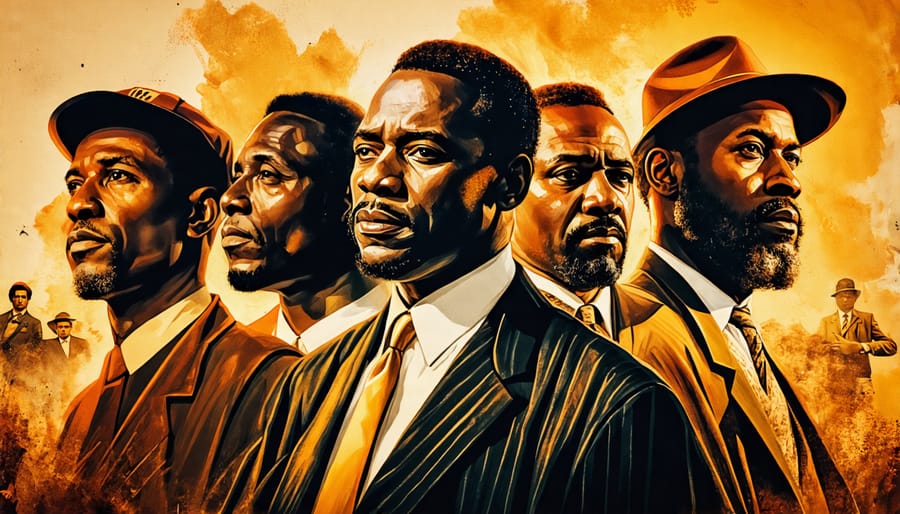Discover the transformative power of faith-driven movements by engaging deeply with biblical teachings. Identify key movements in Christian history, such as the Reformation, that have reshaped how faith is understood and practiced. Reflect on modern movements, like the global house church phenomenon, to see how faith continues to inspire grassroots change. Unite with your community by participating in church-led initiatives that emphasize personal growth and collective well-being, echoing biblical principles of love and service. Embrace personal development through consistent prayer and study, setting aside time daily to deepen your understanding and connection with God. Together, these steps illuminate how faith-driven movements can nurture both individual and communal spiritual growth, fostering a profound impact that resonates beyond church walls.
Understanding Faith Driven Movements

Defining a Faith-Driven Movement
Faith-driven movements in a Christian context are vibrant expressions of shared belief that seek to live out the teachings of Jesus in tangible ways. These movements center around core goals: spreading the Gospel, nurturing personal and communal spiritual growth, and transforming societies through love and service. Grounded in scripture, they emphasize faith as a dynamic, lived experience, urging believers to respond actively to the call of Matthew 28:19-20 to make disciples of all nations. Methods often include community building, compassionate outreach, and advocacy for justice and peace, striving to embody Christ’s love in every action. Through small groups, outreach programs, and mission projects, these movements inspire believers to engage with their communities, fostering environments where God’s word is understood and lived out daily. By encouraging practical application of biblical principles, faith-driven movements invite Christians from all walks of life to contribute to a vibrant, inclusive faith community, celebrating diversity within unity.
Characteristics of Faith-Driven Movements
Faith-driven movements are deeply rooted in a commitment to spiritual growth, community, and service. At their core, these movements emphasize the power of collective faith, fostering a sense of belonging and unity among believers. One unique characteristic is their community focus, where individuals come together to support one another, reflecting the teachings of Jesus. This communal aspect not only strengthens individual faith but also creates a platform for meaningful connections and a shared mission.
Another key attribute of faith-driven movements is their dedication to service. Inspired by the call to love thy neighbor, these movements often engage in outreach activities, striving to make a positive impact in the world. This commitment to service is a practical application of biblical principles, as seen in James 2:17, which reminds believers that faith without works is dead.
Furthermore, faith-driven movements encourage personal spiritual development, guiding members to deepen their understanding of Biblical and Cultural Christianity and apply these teachings in their daily lives. Through bible studies, prayer groups, and retreats, these movements provide opportunities for introspection and growth, nurturing a deeper, more authentic relationship with God.
Historical Examples of Faith-Driven Movements
The Abolition Movement
The abolition movement, rooted deeply in Christian faith, stands as a profound example of how spiritual convictions can inspire societal change. Motivated by the belief that all people are created in the image of God (Genesis 1:27), many Christians viewed slavery as a profound moral wrong. Key figures like William Wilberforce, a devout Christian, were instrumental, tirelessly campaigning for the end of the transatlantic slave trade in the British Parliament. In the United States, leaders like Harriet Beecher Stowe, whose “Uncle Tom’s Cabin” brought the horrors of slavery to the forefront, and Frederick Douglass, a former slave who fervently spoke against injustice, were both driven by their faith.
These figures operated under the biblical mandate to “Proclaim liberty to the captives” (Isaiah 61:1), working toward the shared vision of freedom and equality. The movement’s success in abolishing slavery across parts of the world was a testament to their steadfast faith influencing society at large. Today, this legacy encourages believers to continue advocating for justice and mercy, guided by the unwavering principles of love and compassion as taught in the Gospel.
The Civil Rights Movement
The Civil Rights Movement in the United States stands as a profound example of how faith, particularly Christian values, can inspire transformative social change. Many Christian leaders, including the revered Dr. Martin Luther King Jr., drew upon biblical principles to advocate for justice and equality, reflecting the inclusive and compassionate heart of the Gospel. Churches served as meeting places and spiritual fortresses, where congregations found strength and unity to stand against injustice.
The teachings of Jesus on love and forgiveness were central to the non-violent resistance championed by civil rights activists. Galatians 3:28 reminds us, “There is neither Jew nor Gentile, neither slave nor free, nor is there male and female, for you are all one in Christ Jesus.” These words bolstered the movement’s emphasis on unity amidst diversity, fostering a deep-rooted hope for equality. Through prayer, worship, and community support, Christian leaders played a critical role in breaking down racial barriers and advancing the cause of freedom with unwavering faith.
Embracing the spirit of the Civil Rights Movement invites us all to reflect on how our own faith can inspire actions that promote justice and love in today’s world. The legacy left by these leaders continues to encourage Christians to view social change as a spiritual, God-driven mission of love.


Contemporary Faith-Driven Movements
Environmental Stewardship
For many Christians, embracing their role in Environmental Stewardship is seen as a natural extension of their faith. They draw inspiration from Genesis 2:15, which calls on humanity to “work it and take care of it.” Movements today encourage believers to understand caring for the Earth as a form of worship and a loving response to God’s creation. Churches worldwide are leading initiatives to promote sustainability practices, such as community gardens and recycling programs, bridging faith with practical action. As we look to the future, there is a growing call among Christians to integrate ecological awareness into daily life, emphasizing that protecting God’s creation is both a spiritual and communal responsibility. These initiatives not only foster a deeper connection with nature but also unite communities in common purpose, inspiring hope and action across all Christian traditions.
Social Justice Movements
Christian-led social justice movements are powerful testimonies to living out biblical principles of love, compassion, and justice. These movements, inspired by scriptures such as Micah 6:8, which calls for acting justly, loving mercy, and walking humbly with God, focus on addressing systemic inequalities and providing support for marginalized communities. One notable example is the Civil Rights Movement in the United States, where figures like Dr. Martin Luther King Jr. used Christian teachings to advocate for racial equality and harmony. Globally, organizations such as World Vision and Tearfund work tirelessly to alleviate poverty, promote education, and ensure access to clean water and healthcare, embodying the call to serve “the least of these” (Matthew 25:40). By partnering with local churches and communities, these movements foster empowerment and sustainable change, reminding us of the profound impact that faith-driven action can have. This commitment to social justice not only reflects the core of Christian values but also encourages believers to actively participate in creating a more equitable world.
The Role of Faith and Community
Building Strong Communities
Faith-driven movements are vital in cultivating communities rich in support and fellowship, drawing directly from biblical teachings. Rooted in shared beliefs, these communities reflect the early church described in Acts 2:42-47, coming together in prayer, sharing, and mutual care. Faith-driven movements not only nurture spiritual growth but provide a safe haven where members can seek guidance, encouragement, and love. By fostering a sense of belonging and common purpose, they echo Christ’s commandment to love one another (John 13:34). Through service and outreach, these vibrant faith communities inspire positive change, embodying the light of Christ in the world.
Faith as a Unifying Force
Faith acts as a unifying force by bringing together individuals from diverse backgrounds under a shared belief in God’s love and purpose. This common faith inspires people to work collectively, transcending differences to achieve goals that reflect Christian values of compassion, service, and justice. As the Bible says in Ephesians 4:3, “Make every effort to keep the unity of the Spirit through the bond of peace.” By fostering an environment where love and understanding flourish, faith-driven movements create a sense of belonging and collective strength that empowers communities to enact positive change and support one another in meaningful ways.
Personal Development Through Faith-Driven Movements
Participating in faith-driven movements provides a profound avenue for personal and spiritual growth. Through these movements, individuals immerse in a community that nurtures both heart and mind, fostering a deeper relationship with God and helping them understand and live out biblical teachings. Engaging with others who share similar values instills a sense of belonging and purpose, encouraging believers to explore and apply biblical principles in practical ways. As individuals contribute their unique gifts and talents, they learn about compassion, humility, and service, following the footsteps of Christ. This shared journey strengthens faith, as one witnesses the power of collective prayer and action and sees how God works in diverse and miraculous ways through ordinary lives. Ultimately, these movements encourage a transformative path for believers, helping them to grow holistically and become catalysts for positive change in their communities, living out the call to love and serve others in authentic Christian fellowship.
Conclusion
In reflecting on faith-driven movements, we see a tapestry woven through time, from the fervent revivals of the past to today’s vibrant expressions of faith and community. These movements have consistently sparked profound change by anchoring in the transformative power of the Gospel, illustrating how faith can transcend social and cultural boundaries. For Christians seeking to deepen their understanding, these movements offer not just historical insight but active invitations to engage spiritually and socially. As individuals inspired by faith, we are called to participate in these missions, emulating the compassion and selflessness exemplified by Christ. Through such participation, we not only develop personally but also contribute to a larger narrative of hope and transformation. Let us be encouraged to explore these movements with open hearts, celebrate diversity within the body of Christ, and engage meaningfully in a shared journey towards reflecting God’s love in our communities and beyond.
